#6 FIVE things I never expected about grief
We all have some idea what grief might look like. Here’s what I didn't see coming.

In today’s newsletter, I explore the things that have surprised me the most about grief. This list is by no means exhaustive, but I narrowed it down to five.
These don’t just apply to the death of a loved one, but to grief in all its forms – whether that’s a health scare or a new diagnosis, divorce or other relationship breakdown, job loss or retirement, the end of a significant friendship, a move, or any other major life change. We all have an idea what this change might look and feel like. Here, I reflect on some big parts of the grieving process I never expected.
I’d love to hear from you! When you’re done reading, click the comment button below and let me know:
What’s one thing that surprised you about grief?
In case you’re new here:
Hi! Welcome! I’m so glad you’re here.
I’m Ruhie — a writer, doctor, mum & a daughter who lost her Dad to terminal illness.
Here at “From the Heart to Beyond” I am sharing my journey to live fully and make the most of the time we are given. I reflect on moments that touch my heart and the valuable lessons I am learning along the way in a series of letters to my Dad.
While these letters are deeply personal, they explore topics that are universal and timeless: love, hope, loss, healing, family, and everything in between.
I believe in the power of storytelling to connect people, provide support when we need it most, to teach, liberate and inspire us, and to help us feel less alone in our experience. I truly hope that something in my words and story connects with you, your life, and your story.
Dear Dad,
I saw a post about grief on Instagram the other day that made me do a double-take. It actually stopped my mindless doom-scrolling, which is pretty hard to do!
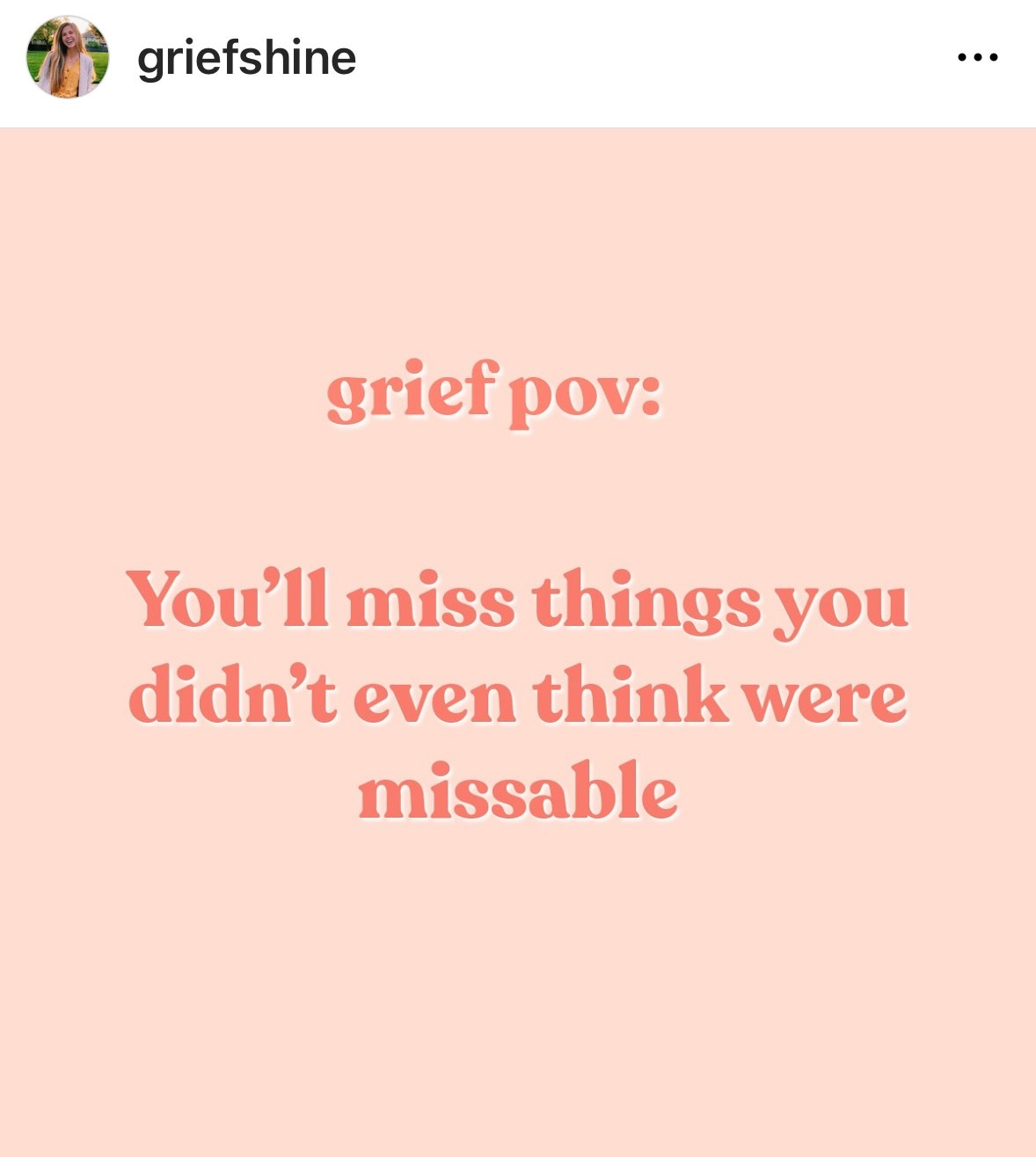
“You’ll miss things you didn’t even think were missable”
Most of us spend most of our lives trying hard not to think about grief. We go through life with blinkers on, avoiding any thoughts or reminders that the people we love won’t be around forever.
It’s only when we are forced to confront this reality – for our family, it was your terminal illness diagnosis – that we might allow ourselves to contemplate what loss will feel like, and what life after loss actually entails.
While some parts of the experience have been expected and predictable, there are definitely things about grief that I didn’t see coming.
1. I miss the most surprising things.
When you lose someone you love, there are the obvious things you know you’re going to miss. Like your smile and infectious laugh. Your eyes, so vibrant and full of life. Your glass-half-full attitude. I miss talking to you about things. I miss the positive energy and fun you brought to our family and everyone you met. The list is endless.
As Alexa from Grief SHINE pointed out in her Instagram post, what I didn’t see coming was missing things about you that I never expected to miss.
Your left thumbnail. Your nails were generally pretty ugly, but unlike all the others, this one was weirdly completely flat. Did you notice how sometimes when we talked or watched TV, I would run my fingers over that nail and remark on its oddly flat surface? I realise now that teasing you about this was just a cover. Really, it made me feel connected to you in a special way. It was something unique about you that only someone really close to you, close enough to touch you, would know.
The way you’d pat me on the back instead of saying hello, but it was more of a slap than a pat. I have a low pain threshold and you were stronger than you realised for your weak older daughter. “Ow Dad! That’s too hard!” I’d remind you every time, but it never changed. I miss getting mad at you about that.
The ridiculous nicknames you made up for me. The ones that only you used. Like “Lulu the ooliyu”. I didn’t mind the “Lulu” part — you affectionately called me that since I was a little kid and couldn’t make the “R” sound so I referred to myself as “Loo-hee”, which you turned into “Lulu”. You added the “ooliyu” when I was older. I hated it. It’s the Gujarati term for an old-fashioned U-shaped metal tongue scraper. I have no idea how you got there, but I guess that’s the nature of nicknames — they go through inexplicable transformations and iterations over the years. Did you know how much I disliked you calling me that back then? The association with a tongue cleaner made my skin crawl. But, Dad, do you know I would give anything to hear you say “Lulu the ooliyu” one more time?
2. It feels good to cry. Crying is cathartic.
One of the strangest things about grief is how much emotion we can feel under the surface without showing it on the outside. Sometimes it’s because we don’t want to show it. We don’t feel safe enough to, or we don’t want to be a downer. But sometimes it’s because we actually can’t express it, even if we want to. Even when we know that bottling it up is not healthy. Sometimes, we need to find the release button on the pressure valve and let out all those feelings that have built up.
When I start to feel this way – let’s call it “griefy” – I’ve found crying it out surprisingly cathartic, to the point of actually seeking it out. I’ll look back at old photos and videos of you, to relive that time. Or I’ll play specific music. Songs you used to love. Songs about losing a loved one. Songs that remind me of you. Does that make me sound nuts? Like I’m a sucker for punishment? Maybe. But I always come out the other side feeling better. And I know I’m not alone. I had a patient who once told me she did something similar after her son died. She made a playlist of all his favourite songs and would listen to them every Friday night while flipping through family photo albums. Friday was his favourite day of the week, and soon with this weekly ritual, it became hers too. It was a way to remember him, to keep his memory alive, to feel closer to him.
Yes, knowingly exposing ourselves to these emotionally-charged reminders of a loved one we lost is painful and sad. But there is something deeply therapeutic about the tears we shed.

3. Grief is now my lifelong companion, showing up in unexpected ways at unexpected times.
Maybe I’m being naive, or maybe we just don’t talk about this enough, but I always expected grief would have a linear trajectory. You start at rock bottom after the loss of a loved one, and slowly make your way back up to baseline. We’ve heard the saying “time heals all wounds” and assume that means our hurt will steadily and irreversibly decline over time.
And there’s some truth to this – grief does evolve over time. The intensity of that initial pain doesn’t stay that way forever. We do resume some semblance of normal life. We get busy and distracted. We start to feel joy again. We get fooled into this false sense of security.
“I’m getting better,” I used to think.
So when all of sudden I’d start crying because something reminded me of you, I felt completely blindsided. The pain of you not being here felt just as acute as it did when you died. Then I’d be okay for a while, until it happened again. And again. Each time, something different would set me down the path of nostalgia and sadness.
“What’s wrong with me?” I truly believed I was doing grief “wrong”.
It took me a while to realise — I’m not the problem. The problem is our perception of grief in society. The picture we see. The narrative we’re sold. There’s this expectation that people will have a defined grieving period, after which they’ll go back to normal. We’ll be “over it”. We’ll have “moved on”.
Losing you made me realise there is no “moving on” from grief. There is no end. Grief stays with us forever. And it is anything but linear. It comes and goes in waves. You can be completely fine one minute – you could’ve been fine for a long time – and be reduced to tears the next.
The other week, I was reading a bedtime story to Az and Riz. A Bluey book based on the episode “Camping”. (oh right, you missed the whole Bluey craze. It’s an animated TV show about a family of blue heeler dogs. Think “The Simpsons”, but more kid-friendly and Aussie. You’d love it.)
I’m exhausted but I try to do the voices like in the show. Bluey (the eldest daughter of the heeler family) befriends another dog at the campsite named Jean Luc whose family are visiting from France. I exaggerate my not-very-good French accent which makes the boys giggle. We see Bluey and Jean Luc playing together, going on adventures, and having the best time. Until a few days later when she can’t find her new friend anywhere and realises he’s gone back home. Bluey is upset, and asks her Mum why Jean Luc had to leave.
I glance over to the next page, and stop.
“Mummmyyy, keep going!” Riz demands. Everything feels urgent when you’re almost four and up way past your bedtime.
“Yeah, why did you stop?” Az follows suit impatiently, but catching one look at my face, instantly reaches for my hand and asks in his gentlest, most serious voice: “Mummy, why are you crying?” He’s only six but he’s so perceptive.
Through tears, I read the next line, my voice and heart breaking in unison.
“Sometimes special people come into our lives, stay for a bit, and then they have to go.”
I know it’s a fictitious story about a cartoon family of dogs, but it’s so true and felt so personal. I couldn’t help but think of you.
It’s not the first time something like this has happened, and I’m sure it won’t be the last. Every now and then, for the rest of our lives, we will see reminders of loved ones we’ve lost, often in the most unexpected ways or at the most unexpected times. It can be painful and upsetting. But grief is here to stay – we have no control over that – so there’s no point fighting it. I’m used to this now.
In fact, I’ve grown to love these little reminders of you in my day-to-day life. They give me a chance to think about you, talk about you, tell my kids about you. When you’re facing the rest of your life without someone who meant so much to you, you’ll take any opportunity to remember them or relive your time with them. As strange as it may sound, I look forward to these little pangs, these tugs at my heartstrings in the place in my heart where you now live.
4. Grief is not the bad guy.
I think grief gets a bad rap. Because of its association with negative emotions – loss, sadness, anger, pain, guilt, loneliness – we think grief itself is the enemy. But it’s not.
The other day, I saw this quote I haven’t heard before and it blew me away.
“Grief is the price we pay for love”
It occurred to me that grief and love are not diametrically opposed as I’d always thought – they in fact go hand in hand. Loving deeply means there will be hurt after loss, it is unavoidable. And hurting deeply after loss implies a profound love pre-existed.
Grief is a testament to the love we had for the person we lost, the depth of our relationship with them, and the strength of their ongoing legacy. It is how we keep love alive after they are gone.
So really, grief and love are two sides of the same coin. You can’t have one without the other.
5. Grief has shifted my perspective on life.
There is nothing like losing someone you love to make you rethink what is truly important in life. To open your eyes to how much time and energy we spend on all the wrong things. To inspire you to want to choose a different path.
Dad, you were a self-confessed workaholic. I’ve never met anyone who was more dedicated to or passionate about their job. And yet, I know how you felt when your health was failing and you were inching closer to the finish line. I know because you told me, and because I saw the regret in your eyes.
No one gets to the end of their life and wishes they worked harder, got that promotion, bought a bigger house, better car, had more followers on social media… the list goes on.
They wish they had spent more time with the people they loved.
They wish they hadn’t put off doing things that spark joy and light them up inside.
They wish they had focused more on the quality of their experiences and relationships, than on material possessions.
They wish they hadn’t taken their health and body for granted.
They wish they had worried less about what other people thought.
They wish they had shown more kindness towards themselves and others.
They wish they had said “I love you” more.
They wish they hadn’t taken life for granted.
I wish it didn’t take losing someone I loved to figure all this out. To learn that what truly matters in life is to make the most of the time we are given. But if that’s what it took – if I had to learn the hard way – then I guess I’m lucky I learnt before it was too late, right?
Since losing you, my compass, my north star, my guiding light – whatever you want to call it – has now become this question:
“What is going to matter to me at the end of my life?”
It might sound a little morbid, but reflecting on this question has helped me make important decisions, to let go of things that don’t serve me, and to show up for the things that truly matter.
Miss you every day, Dad. Love you always. Until next time 💌
Ruhie
I’d love to hear from you! Click the comment button below and let me know:
What’s one thing that surprised you about grief?
Thanks so much for being here! If you got value from this and you think others might too, please:
Click the HEART button below 💟 and leave me a COMMENT 💬
SUBSCRIBE for free to “From the Heart to Beyond”
SHARE my newsletter with someone you think would enjoy it
And don’t forget to:
🌈 Live Fully
💛 Love Deeply
😁 Laugh Often
⏳ Make the most of the time we are given



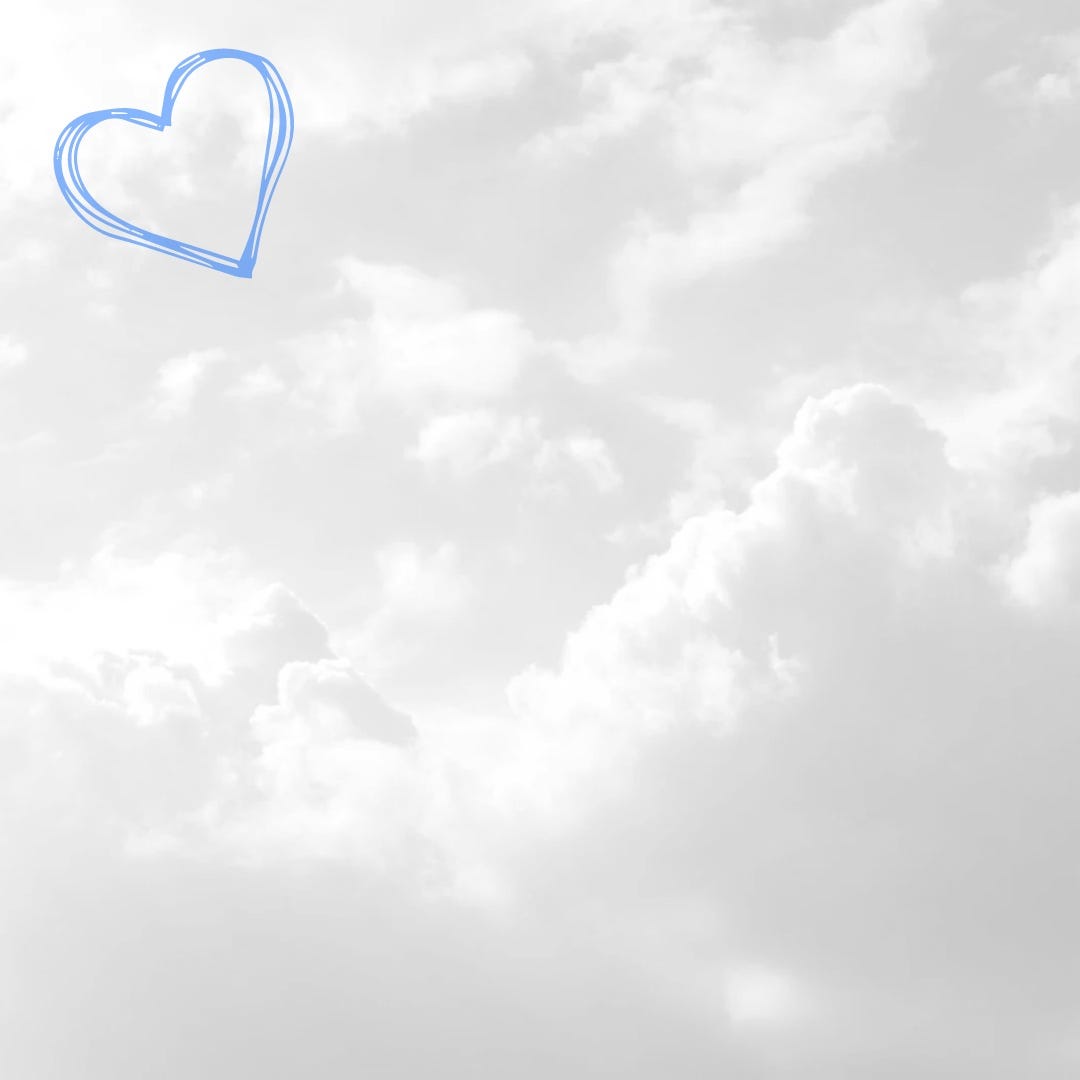
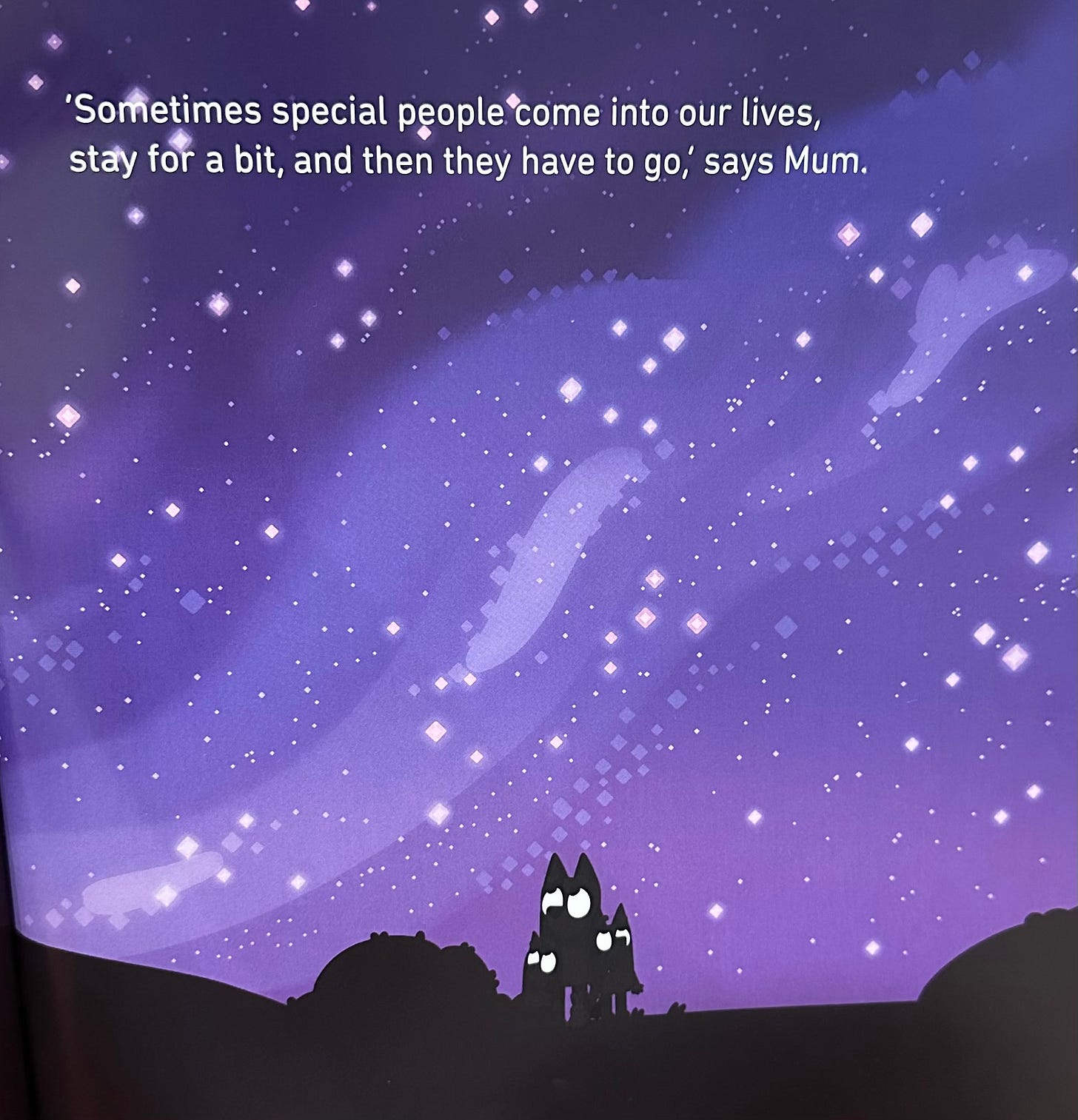
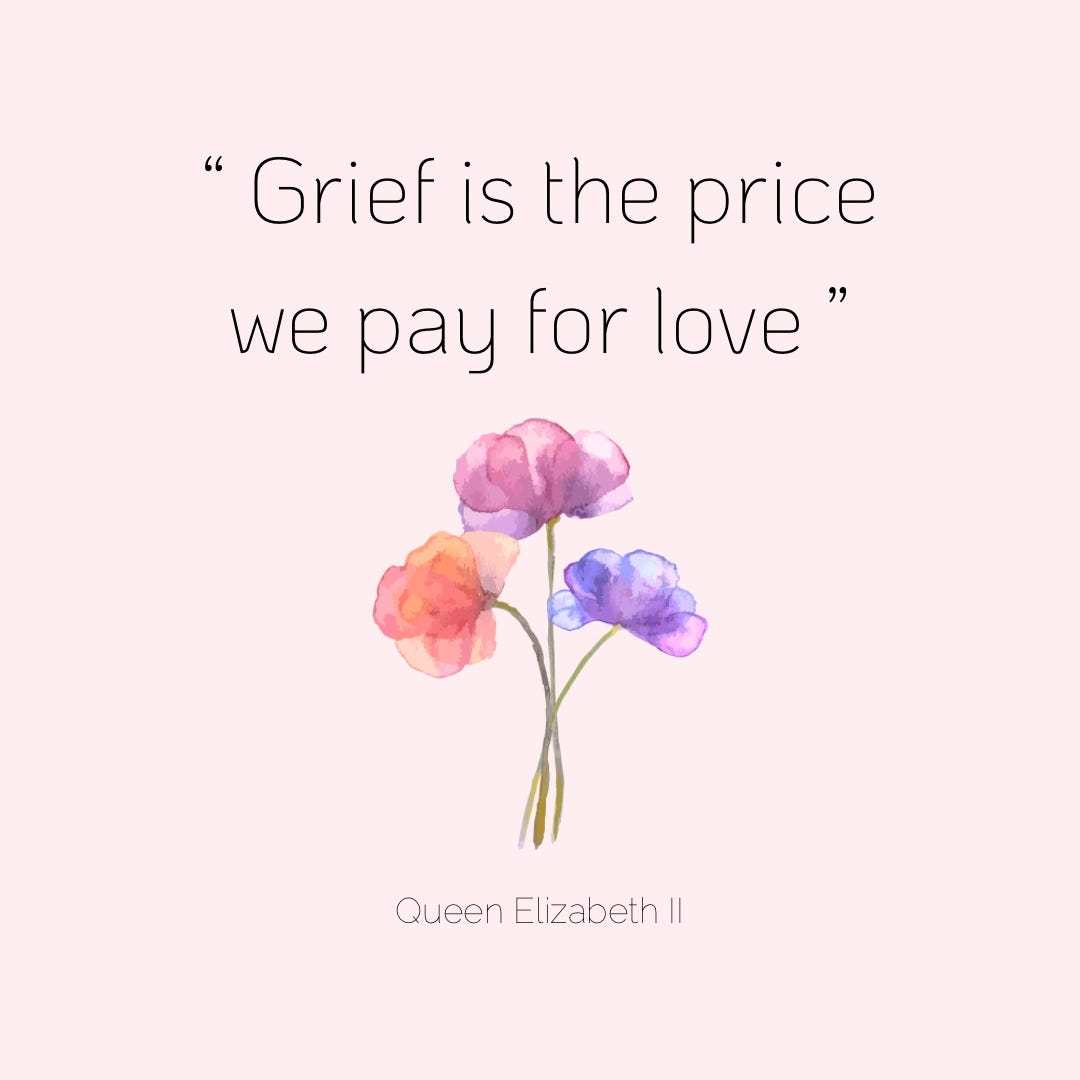
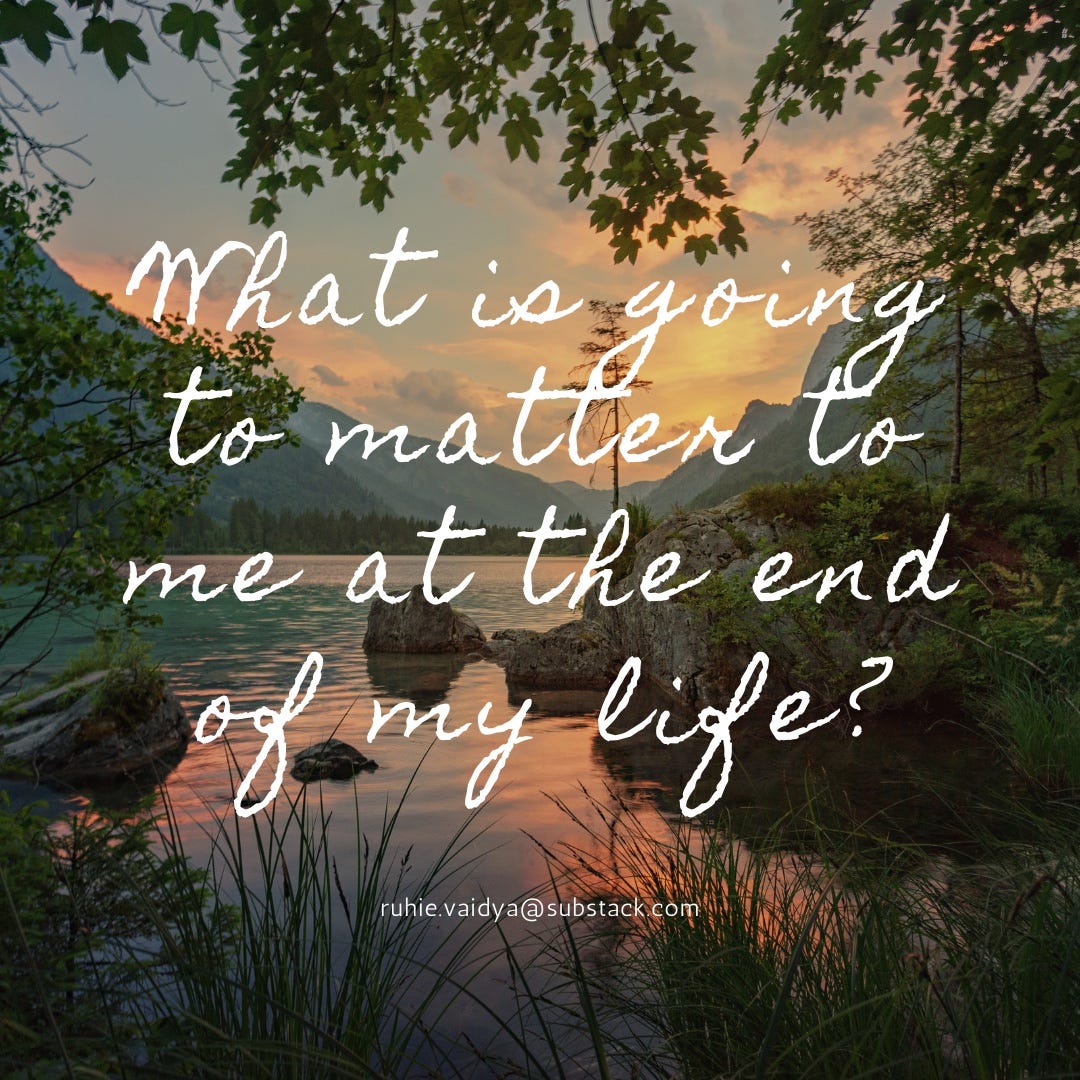
Beautiful letter ‘Lulu’! It really gives us a different way of looking at grief.
You’ve brought up such precious memories of your Dad.
Do you remember him making fun of the way I skipped on the deck on Balfour Rd? I would get annoyed when he copied the way I skipped. I remember him laughing mischievously with his deep dimples as he did the action.
It brings a smile to my face when I think of that today but sad that I took those moments for granted while he was with us.
Thank you for keeping his memory alive through these letters whilst giving us some valuable insights.
Your final few points are totally what is at the crux of grief. People can read about the points you’ve made on taking life for granted but really need to experience grief before they can truly understand.
Your final point on death isn’t grim at all and reminds me of a Greek stoic philosophy ‘memento mori’ remember death is exactly about this. To live like we are dying because we are and will one day. Not a lot of what we worry about will matter on our deathbeds. Keen to follow your journey through your writing x